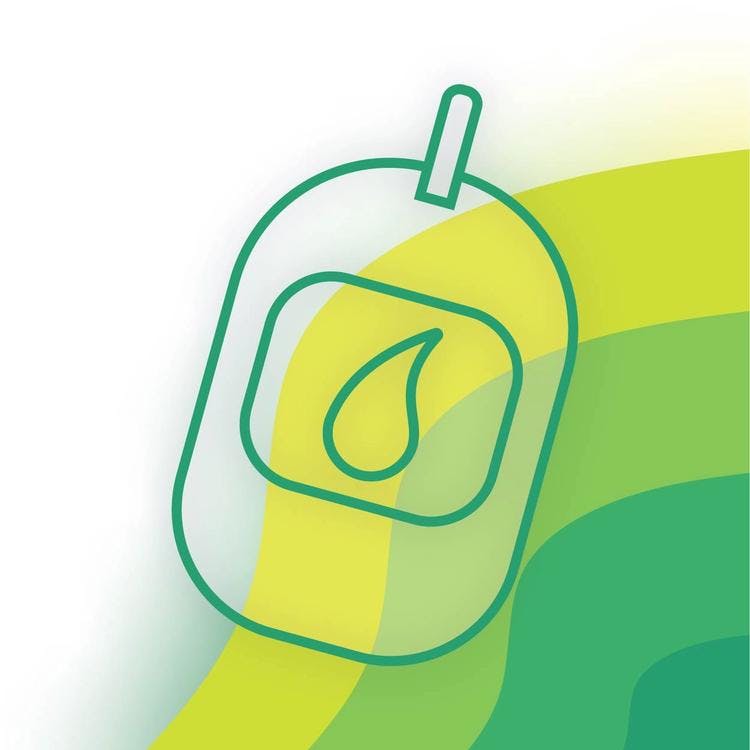What is diabetes?
Glucose is a type of sugar that the cells in your body need to do their job. The food we eat is broken down to glucose. Glucose levels in the blood are tightly controlled by your body, because it is very important that the glucose levels are not too high or too low. The glucose levels are controlled by your body through the hormone Insulin, that your pancreas produces. Insulin acts like a key that allows glucose to go from the blood into the cells.
Diabetes is a disease that occurs when glucose levels are too high in the blood. This occurs either because your body is not producing enough insulin or your body does not use insulin effectively.
There are two main types of diabetes:
Type 1 Diabetes: occurs when the body is not producing enough insulin, and as a result, sugar in the blood is not lowered. This usually affects younger people.
Type 2 Diabetes: When the body is resistant to using the insulin produced by the body to lower blood sugar levels. This occurs in adults and is much more common.
Other forms of diabetes include diabetes that may develop during pregnancy, called Gestational Diabetes.
Risk factors
The following increase your risk of developing diabetes:
- Being overweight or obese
- Lack of exercise or physical inactivity
- Family history of diabetes
- Previous diabetes in pregnancy
Symptoms
- Constant thirst
- Passing more urine than usual
- Tiredness
- Unexplained weight loss
- Blurred vision
- Regular episodes of thrush
What can happen without treatment
Having uncontrolled levels of glucose in your blood can cause serious harm to your health and wellbeing. High glucose levels affect blood vessels and nerves severely and make a person immunocompromised or susceptible to infections. Below are some specific diseases that diabetes can cause.
Hardening and narrowing of blood vessels
The effect high glucose levels have on your blood vessels is severe.
It can cause disease in places where small blood vessels are incredibly important. These places include your kidneys and eyes. This is why people with diabetes are at high risk of developing vision impairment and blindness as well as kidney failure. If you are diabetic, make sure that you go to the doctor every year to have your eyes checked.
Uncontrolled diabetes also affects larger blood vessels. This can result in heart disease (such as heart attacks), strokes (when parts of your brain can’t get enough blood) and erectile dysfunction, which can impact your sexual health.
Impaired immune system
Uncontrolled diabetes can have a devastating effect on your immune system, which is responsible for fighting off infections. It also impacts how easily your body can heal after any injury. Because of this, surgeries are more risky if diabetes is uncontrolled.
Impaired nerve function
Uncontrolled diabetes can cause your nerves, mostly in your hands and feet, to not function properly. It can result in numbness in your hands and feet. Often the numbness can be so severe that patients don’t realise that they have burnt or injured their feet, which results in severe infection. This increased risk of foot infections with the decreased ability of the immune system, described above, can result in the need for foot or limb amputations.
Diabetic Foot
Diabetic foot encompasses a vast range of problems that uncontrolled diabetes can cause. Due to the effects of uncontrolled diabetes on your blood vessels, immune system and nerves, you can be at high risk for severe foot problems, such as gangrene (tissue death). Diabetics are 15 times more likely to have an amputation. One in six diabetics will develop foot ulcers which can lead to severe problems. Globally, a diabetic loses a foot every 30 seconds due to poor control and bad foot care.
It is therefore important that you look after your feet well. Read the additional resource on how to look after your feet. Below are some Do’s and Don’ts.
Do’s:
- wash your feet daily
- dry your feet and look at them daily, especially in between the toes
- trim your nails carefully
- you can use antifungals
- wear comfortable shoes
- wear normal socks, but be sure to wear clean socks every day
Don’ts:
- walk barefoot
- burn your feet by sitting too close to a heater
- cut your nails too short
- ignore comfort
These features of uncontrolled diabetes are serious and worrisome. Thankfully, these things can be prevented simply by controlling diabetes. We describe how to do this below.
Prevention and management
Lifestyle changes
It is important to understand that diabetes can be controlled or at least partly controlled by lifestyle changes. Some important lifestyle changes that can treat or even cure Type 2 Diabetes include:
- Cut down on sugary drinks (including fruit juice) and reduce eating food that contains a lot of sugar (sweets, cookies and other baked goods)
- Avoid food with refined sugar, such as white bread, and rather eat foods with whole grains.
- Cut down on salt (have less than a teaspoon of salt a day)
- Avoid drinking alcohol. Read our pamphlet on alcohol for more information.
- Exercise can help you control Type 2 diabetes greatly. By simply moderately exercising 30 minutes a day for 5 days a week can rapidly improve your health. Read our pamphlet on exercise for some tips.
Look after yourself
Check blood sugar levels at the clinic or pharmacy. By knowing what your blood glucose levels are doing, you and your doctor can make sure that you are on the right treatment plan.
It is incredibly important to look after your feet by checking each day if there are any wounds. Wear comfortable shoes and make sure they do not have stones in them. Avoid walking barefoot outdoors and make sure that you do not burn your feet by having them too close to the heater or fire.
Follow your treatment plan
If you are on any medication, prescribed by your doctor, make sure that you follow the plan closely. Use the medication function in this app to set reminders and to better understand your medication. The better you remember to take your medication, the more easily your diabetes can be controlled.
What to look out for
There are certain things to be weary of depending on which type of diabetes you have and what medication you are on.
Type 1 Diabetes
If you have type 1 diabetes, you will be using Insulin for treatment. Usually the body produces just the right amount of insulin for the amount of glucose in the blood. But since this is not the case in type 1 diabetes, the challenge is knowing how much Insulin to give and when in relation to eating food.
There are different types of Insulin that act differently. Long acting insulin helps lower glucose levels throughout the day, whereas short acting insulin helps control the spike in glucose after meals. It is important to discuss with your doctor when you should take which insulin, bearing in mind that it may be in relation to when you eat food.
What happens if you don’t use insulin?
Because the body cannot consume glucose without insulin, it may resort to other forms of energy when insulin hasn’t been injected for a while. In the case of not using insulin, blood glucose is very high yet the body can’t make use of it for energy and so it resorts to a type of fat - ketones - for energy. The use of this type of fat only works for a short while, as it can alter the chemical balance in the blood. This alteration can cause “Diabetic Ketoacidosis” also called DKA. DKA can be very dangerous and if this is suspected one should go to the hospital immediately.
The symptoms of DKA include:
- excessive thirst
- confusion
- loss of consciousness
- weakness
- a fruity-scented or sweet smelling breath
- nausea and vomiting
- stomach pain
What happens if you use too much insulin?
Using too much insulin than required can also be dangerous. Using too much can result in too little glucose in the blood. If you suspect this, make sure that you have a sweet or some source of sugar to eat. If it is very severe, you may have to go to hospital.
The symptoms of low blood sugar include:
- an irregular or fast heartbeat
- shakiness
- pale skin
- sweating
- anxiety
- hunger
- irritability
Type 2 Diabetes
Uncontrolled type 2 diabetes (high levels of glucose in the blood) in the short term can cause what is known as Diabetic Hyperosmolar Syndrome (HSS). This can lead to life-threatening dehydration and therefore you should be aware of the signs and symptoms. They include:
- excessive thirst
- excessive urination
- dry mouth
- fever
- drowsiness
- confusion
- hallucinations
In type 2 diabetes, there is a lower risk of developing low blood sugar compared to type 1 diabetes. However, if you are using insulin as part of your treatment for type 2 diabetes, make sure that you read the above section on insulin use.



